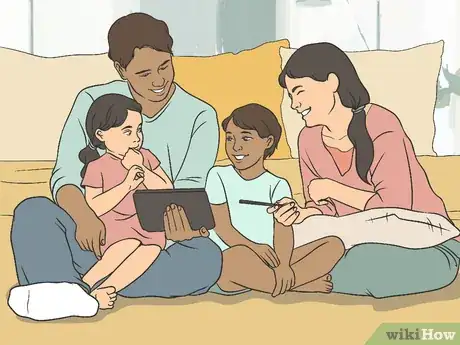This article was co-authored by John Keegan. John Keegan is a dating coach and motivational speaker based in New York City. He runs The Awakened Lifestyle, where he uses his expertise in dating, attraction, and social dynamics to help people find love. He teaches and holds dating workshops internationally, from Los Angeles to London and from Rio de Janeiro to Prague. His work has been featured in the New York Times, Humans of New York, and Men's Health.
This article has been viewed 37,350 times.
Dating with kids can be scary, especially if two sets of children are involved. At the same time, it can be comforting to date another single parent. While dating with children has its own complications, it can be positive for you, your partner, and the children involved. Openly communicate with your partner and with your kids. Don’t force any relationships, even if you really want to be liked by your partner’s children. Give attention to your own kids and also spend time with your partner’s kids as the relationship develops.
Steps
Communicating with the Person You’re Dating
-
1Talk openly with your date. It may seem scary, but talk about how each of you feels about the relationship. Discuss how you may involve the children in your relationship and what that may look like in the future. Talk about how often each of you sees your own children and any complications with an ex regarding the children.[1] [2] If it makes you feel more comfortable, then you can also avoid talking about the future and stick to discussing general rules that you have about dating someone regarding your kids. This may help to open up communication about these things earlier than normal. However, keep in mind that this may not always be possible.
- How big or small of a role with each of your children play in the relationship, and how might that affect you as a couple? What variables should go into making that decision? The age of the children? How big a role you already play in their life and decisions regarding them?
- What’s the relationship like with the exes for both of you? How might that complicate the relationship?
-
2Take your time. There’s nothing to rush when entering a relationship and kids are involved. Give you and your partner time to figure out what you want and whether you can realistically make a relationship work. If the potential to merge your families might exist in the future, think about what that may be like for you, your partner, and your kids. If merging both of your families is unrealistic, cautiously consider if you will move forward in the relationship.[3]
- Be upfront about having kids, but don’t rush to introduce them to the person you’re dating. Wait until you are solidly a part of each other’s lives and see a future together.
- Keep in mind that your kids will notice things and have questions. Do not lie to them during this time or try to hide the fact that you're dating. Also, be aware that young children may not understand what dating means, so you will need to explain in words they can understand.
Advertisement -
3Create boundaries and rules. Talk about what is acceptable for your relationship regarding spending time one-on-one, being with your or their kids, staying over, dating, and phone calls. Once you and your partner are clear, discuss these things with your children as well. This can help your children feel involved and informed for what happens in their house.[4] [5] Decide how you will spend time together, where you will spend time together, and what kind of communication is acceptable. Can your date come to your children’s soccer game or accompany you to a work function? Will you let your ex know the kids are meeting someone new?
- Make sure to be flexible as well. Take time to reassess the situation every couple of months and discuss what is working and what is not working.
- Your children may wish to voice their concerns or ask questions. It’s important to listen to them and validate their feelings. Remember, though, that you are the adult and make the final call.
- Finding a balance between being there for your kids and making a new relationship work can be difficult, and often will require changing or canceling plans based on your children’s or your date’s children’s needs.
Talking to Your Children
-
1Speak openly with your children. Don’t keep your kids in the dark when it comes to dating someone new. Let your children know that you’re dating and that your partner has children. If and when it comes time for your children to meet your partner’s children, they should be prepared without making any last-minute discoveries, especially involving other children. This may make them feel threatened. Children don’t want to be left in the dark about important things, so let them know what’s ahead.[6] [7]
- Talk to your kids about dating someone that has kids. You may want to tell your kids about them or show them pictures of who they will meet.
- Speak with your children individually to inform them of your relationship and any future plans you may have. Children want to be told the truth, but you may wish to give older children more information than younger children.
- Be sure to keep the lines of communication open as well. Your children might not have questions right away, but let them know that they can come to you to talk or ask questions at any time.
-
2Give your kids plenty of attention. Kids may begin to feel jealous of you if you’re spending time with someone else. They may begin to resent the person you are dating for taking you away. Help to calm your children’s fears by spending time with them. While it may be easy to get wrapped up in your new relationship, set aside time to spend with your kids and assure them that they are a priority.[8]
- Spend one-on-one time with each individual child. Assure them that you love them and that nobody is intentionally trying to harm or hurt them.
-
3Let the children have some control. If you’re spending time with your partner’s children, let them take the lead in your relationship. Don’t force a relationship with your partner’s kids, and also don’t force your own kids to form a relationship with your partner. Don’t force hugs or kisses or any kind of physical affection and let the children initiate affection on their own terms.[9]
- Try teaching your kids appropriate greetings, such as shaking hands and introducing themselves.
- Make time spent with their kids enjoyable and vice versa. Plan activities that the kids will enjoy so that they look forward to spending time with you or your partner.
-
4Make soft invitations to older children. If your children are older or your partner’s children are older, make invitations for them to get to know your partner. If you’re focusing much effort on having your child accept your partner, you might push too hard and push them away. Provide opportunities for your teen or adult children to get to know your partner on their own terms, and encourage your partner to do the same.[10]
- For example, say, “Jamie is coming over for dinner tonight. You’re welcome to eat with us if you’d like to join. I won't pressure you, but it would mean a lot to me." This last statement is helpful because otherwise it might sound like you're including them as an afterthought.
Spending Time with Each Other’s Children
-
1Use careful introductions. You may wish to pace your new relationship with your children. For example, you might casually introduce your children to your partner as a friend, or if your children are prepared, as a date. While a casual introduction may be appropriate for a new date, don’t blend children and your partner unless you feel confident in the possibilities of your relationship. When meeting your partner’s children, use the same rules in introductions and spending time together.[11]
- Say, “This is the person I told you about. We’re spending time together.” You can also say, “I told you I was dating someone, and I’d like you to meet Chris.”
- Be sure to consider where you’d like to make the introduction. For example, a neutral location, such as a coffee shop or park, may seem less threatening to your child. Or, your child might feel more comfortable in an environment that is familiar to them, such as at home.
-
2Expect mixed reactions from kids. Children may respond to meeting you by being excited, resentful, fearful, happy, and sad. Children may struggle with loyalties to their other parent and feel like liking a parent’s new girlfriend or boyfriend is turning their back on their other parent. If your partner’s children don’t accept you immediately or are hot/cold toward you, recognize that this is normal. Be friendly and open with them, yet give them time and be available to them.[12]
- The same goes for your own children. If you feel disappointed that your children aren’t warming up as much as you’d like to your partner, relax and give it time. Don’t push them into a relationship and accept their feelings.
- Do not shame them for whatever they are feeling. Let them process their feelings however they normally do and then ask them later how they are feeling.
-
3Get to know each others' children. Instead of arranging large get-togethers with both your date’s children and your own, focus on spending time with each other’s kids first. For example, spend a day with your partner’s kids one weekend, then with your partner and your own kids the next weekend. Get to know each other’s kids separately before putting them all together. This can add a level of comfort for your children instead of them feeling thrown in to socializing with many strangers.[13]
-
4Explore new family activities. If you choose to spend time with both your and your partner’s children together, find a new activity that can become special to all of you. Creating something together can bring a sense of unity and teamwork to the dynamic. Doing something new for everyone can encourage everyone to interact and get to know one another in a unique and fun environment.[14]
- Go to a trapeze school, explore indoor climbing, or work on an art project together.
Building a Strong Relationship
-
1Spend quality time together. Your time might be short due to your family obligations, so make your time count. Enjoy your time together and do activities that you both enjoy. Discuss the important things about who you are, your family, your kids, and whatever is important to you. Do activities that are fun and meaningful to both of you.
- If you’re not sure about a date or a future together, listen to your gut feelings and keep your children and their children in mind if you’re considering moving forward.
-
2Plan some low-key dates. There may be times when one of your kids is sick or your partner can’t find a babysitter. Learn to love low-key nights of watching a movie at home or going on a walk together. While it’s nice to go on dates that include dancing or adventure, learn to enjoy quiet nights at home, too.[15]
- Dress your take-out dinners up by adding candles and eating with real plates and silverware.
-
3Have reliable babysitters. When both you and your partner have kids, expect the unexpected. For example, if your ex is supposed to have the kids but you’re suddenly left with them on a night you planned a date, have a list of babysitters that can come through on late notice. Have a few babysitters available so that one can cover if another is busy.
- Ask your partner if they have backup plans for last-minute changes and readily available babysitters.
-
4Find ways to cope with stress. Blending two families can be a stressful process, so it is important for you to practice self-care and seek help if you need it. Try to set aside at least 15 minutes every day to use a relaxation technique as well.
- You can try using yoga, meditation, or deep breathing to relax.
- Talk to friends and family for support. You may also consider seeing a therapist if the stress gets to be too much for you.
References
- ↑ https://www.betterrelationships.org.au/family-parenting/blended-families/introducing-your-new-partner/
- ↑ John Keegan. Dating Coach. Expert Interview. 8 April 2021.
- ↑ https://www.familyeducation.com/life/dating-after-divorce/involving-your-children-your-new-relationship
- ↑ https://www.betterrelationships.org.au/family-parenting/blended-families/introducing-your-new-partner/
- ↑ John Keegan. Dating Coach. Expert Interview. 8 April 2021.
- ↑ http://divorcedmoms.com/articles/dating-6-tips-for-making-it-work-when-you-both-have-children
- ↑ John Keegan. Dating Coach. Expert Interview. 8 April 2021.
- ↑ https://www.familyeducation.com/life/dating-after-divorce/involving-your-children-your-new-relationship
- ↑ http://www.familylife.com/articles/topics/parenting/challenges/single-parenting/11-best-practices-for-dating-as-a-single-parent
- ↑ http://www.familylife.com/articles/topics/parenting/challenges/single-parenting/11-best-practices-for-dating-as-a-single-parent
- ↑ http://www.familylife.com/articles/topics/parenting/challenges/single-parenting/11-best-practices-for-dating-as-a-single-parent
- ↑ http://www.familylife.com/articles/topics/parenting/challenges/single-parenting/11-best-practices-for-dating-as-a-single-parent
- ↑ http://www.familylife.com/articles/topics/parenting/challenges/single-parenting/11-best-practices-for-dating-as-a-single-parent
- ↑ http://www.parents.com/parenting/divorce/blended-families/challenges-of-blended-families/
- ↑ http://divorcedmoms.com/articles/dating-6-tips-for-making-it-work-when-you-both-have-children










































































